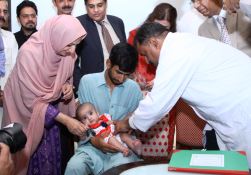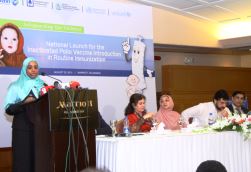 A child is vaccinated using inactivated polio vaccine (IPV) at the national launch of IPV into the routine immunization programme in Islamabad, Pakistan, presided over by the Honorable Minister of State Mrs Saira Afzal TararIslamabad, 24 August 2015 -- Pakistan has taken another step towards a polio-free future on Thursday, introducing IPV into its routine immunization schedule at a ceremony presided over by the Minister of State, Ministry of National Health Services Regulation and Coordination, Mrs Saira Afzal Tarar, and attended by representatives of WHO, UNICEF, GAVI and other development partners, such as USAID and the UK Department for International Development, in the capital, Islamabad.
A child is vaccinated using inactivated polio vaccine (IPV) at the national launch of IPV into the routine immunization programme in Islamabad, Pakistan, presided over by the Honorable Minister of State Mrs Saira Afzal TararIslamabad, 24 August 2015 -- Pakistan has taken another step towards a polio-free future on Thursday, introducing IPV into its routine immunization schedule at a ceremony presided over by the Minister of State, Ministry of National Health Services Regulation and Coordination, Mrs Saira Afzal Tarar, and attended by representatives of WHO, UNICEF, GAVI and other development partners, such as USAID and the UK Department for International Development, in the capital, Islamabad.
The introduction of the inactivated polio vaccine (IPV) across Pakistan will benefit more than 6 million children per year, and will be administered to children alongside other life-saving vaccines.
Pakistan is one of 3 countries in the world where polio remains endemic. Nigeria, which recently marked one year without a case of wild polio, introduced the vaccine earlier this year and Afghanistan is due to begin using IPV in the coming weeks.
Pakistan’s national introduction of IPV marks the fulfilment of the global commitment to meet one of the 4 major objectives of the Polio Endgame Strategy that calls on all oral polio vaccine (OPV)-only using countries to introduce at least one dose of IPV into routine immunization schedules by the end of 2015, strengthen routine immunization and withdraw OPV in a phased manner, starting with type 2-containing OPV.
The worldwide roll-out of IPV across 126 countries by the end of 2015 is part of the largest and fastest globally coordinated vaccine introduction project in history. The initiative is funded as part of the budget of the Global Polio Eradication Initiative (GPEI), and support is channelled through GAVI, the Vaccine Alliance, WHO and UNICEF.
Speaking at the launch, the Honorable Minister stated that the introduction of IPV is a major landmark to accelerate polio eradication and secure a lasting polio-free world. But she stressed that the official launch in Islamabad was only the first of many steps on Pakistan’s road to zero cases.
“I would like to stress that the mere provision of vaccine is no success. Real success is getting this vaccine to the communities, families and children who need them. We have to ensure every eligible child takes benefit from IPV. Real celebration will come when we are able to achieve optimal levels of routine immunization,” said Mrs Saira Afzal Tarar, Minister of State.
The vaccine has been successfully introduced into routine immunization schedules in 36 districts in Lahore, Punjub province, alongside the OPV, large-scale use of which has reduced the incidence of polio by more than 99% worldwide. New evidence now clearly demonstrates that adding one dose of IPV to OPV is the most effective method to stop the virus and protect children from life-long polio paralysis.
“The introduction of IPV is a vital step on the journey to securing a polio-free world for all future generations to come,” said Aziz Memon, Rotary International, speaking on behalf of the Global Polio Eradication Initiative. “Adding at least one dose of IPV to the routine immunization schedule is the best possible way to protect your children from life-long polio paralysis, while the disease is being eradicated from the remaining endemic hotspots.”
 Dr Lamia Mahmoud, Medical Officer, WHO Pakistan, speaking on behalf of WHO Representative Dr Michel Thieren at the launchIn a statement delivered to the gathering on behalf of WHO Representative to Pakistan Dr Michel Thieren it was highlighted that the introduction of a new vaccine into Pakistan’s routine immunization programme was an opportunity to renew training on all facets of the immunization system, including storage, technique, safety, surveillance and micro-planning to reach the most vulnerable children.
Dr Lamia Mahmoud, Medical Officer, WHO Pakistan, speaking on behalf of WHO Representative Dr Michel Thieren at the launchIn a statement delivered to the gathering on behalf of WHO Representative to Pakistan Dr Michel Thieren it was highlighted that the introduction of a new vaccine into Pakistan’s routine immunization programme was an opportunity to renew training on all facets of the immunization system, including storage, technique, safety, surveillance and micro-planning to reach the most vulnerable children.
“Reaching these children with vaccines and other maternal, neonatal and child health services brings Pakistan closer to realization of Millennium Development Goals and making children healthier and happier thus making Pakistan a better and more productive place”
Pakistan has made significant progress in the fight against polio with a 75% reduction in the number of cases compared to the same period last year (from 115 cases to 29 cases). This decline shows that despite major challenges and remaining hurdles in some provinces, Pakistan is getting closer to polio eradication. However, the country still accounts for more than 80% of cases worldwide so far this year, and many children in high-risk areas of the country remain un- or under-immunized.
To address this situation the Prime Minister Nawaz Sharif endorsed the National Emergency Action Plan to stop polio transmission as surveillance indicates widespread circulation of polioviruses, not just in known infected areas but also in areas without cases. This plan clearly identifies areas with disproportionate numbers of under-immunized children, and puts in place area-specific plans to overcome challenges and reach these children – who are the most vulnerable to polio – with polio and other life-saving vaccines. Emergency operations centres at national and provincial levels ensure real-time monitoring of activities, implementation of immediate corrective actions and direct oversight by government at all levels and increased accountability.
IPV will be given at 14 weeks of age alongside the third dose of OPV, pentavalent vaccine – which protects against diphtheria, tetanus, pertussis, hepatitis B and Hib – and pneumococcal vaccine. GAVI is supporting the use of pentavalent and pneumococcal vaccines in Pakistan.





